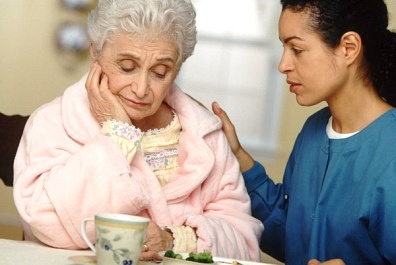Being Helpful During Bereavement

Being Helpful During Bereavement
The death of a loved one is always difficult. But, when an elderly person loses what may have essentially been their best friend and lifeline makes it even more difficult. Even though it is not so much as a surprise, and is more or less realistically expected, it is still always painful.
It is important to understand that grief is an individual experience. Grief is a natural emotional response to bereavement, which is a major loss. Some major factors on how much and how hard the grieving process will be depend on several things.
- Experiences: First marriage will usually be harder than subsequent marriages. However, having many years together can cause the loss to be as painful as a first.
- Religiosity: How hard a person takes a loss depends on their ability to find comfort through religious beliefs.
- Personality: Having a resilient personality can make grieving less difficult.
- Circumstances of death: Death due to Alzheimer's, cancer, suicide, or age will vary and may not be bereaved in the same ways, but must still be addressed.
- Gender: Men tend to grieve inward, keep to or isolate themselves. Women tend to grieve outward, share their feelings with others. The death of a spouse is also much harder on men than women. Women tend to be the source of a couples social life. When she is gone he is left and feels awkward around what were probably primarily her friends.
A person may stop grieving heavily after about twelve to sixteen months. However, there is no "normal grieving period". Anything a person does when they suffer a loss is normal. People grieve the way they learned to grieve by their culture or family.
The impacts of widowhood are quite daunting. A decline in health will usually be present. Their general health will suffer along with an increase risk of mortality (death). Also, emotional distress will manifest as loneliness and depression, along with a profound sense of loss. This will not always be the case, a Changing Lives of Older Couples (CLOC) study found that 18 months after death of a spouse 45.6% felt loss, and depression and prolonged or delayed grief was rare.
It must be known that bereaved older adults are capable of resilience. A newly single elderly may want to rekindle relationships with family or friends but may be difficult at first and may not prove successful if they were not the ones who connected the family in the first place.
The ability to be helpful largely depends on the relationship with the person who suffered the loss. It is important to know that simply being there to listen can be incredibly comforting. You must also be comfortable with bouts of anger, regrets, and tears. Or silence, numbness, and denial.
NOTE: If they threaten to hurt themselves or are neglecting their health in any way, they must receive professional help immediately.
What NOT to say:
- "I Know just how you feel." Everyone's pain unique.
- "She is in a much better place now." This may come from a good place but depending on the circumstances may further upset the bereaved.
- "It's all part of God's plan." Keep your beliefs to yourself.
- "Get on with your life already." People move on at their own pace.
All of the above phrases are insensitive and will not comfort anyone. Refrain from using directive phrases as well. Telling someone what they should or will do is untimely and harsh under the circumstances.
What you CAN do:
- Just show up. Words are not necessary to comfort someone. Sit in silence, offer to hold their hand or give them heartfelt hug.
- Let the bereaved talk about the death as long and as many times as they need to. They may need to re-tell the event to process and come to terms with it. This is very helpful as it tends to lessens the pain.
- Do not minimize the loss. This is a highly stressful event in which most cases is life altering. Offer support by letting them know what they are feeling is okay.
- Give them permission to grieve anyway they need to. Make it safe for them to cry, scream, or let go anyway they need to. That they may break down if they must with no criticism or judgement from you.
Being able to grieve where there is love and emotional safety can be very healing and bonding. Take the opportunity to grow and nurture this relationship.
Family and friends can be helpful in other ways as well.
Other -more practical- ways to help:
- Funeral arrangements
- Feeding/walking pets
- Answering the phone/mail/email/door
- Make warm meals
- Housework/laundry
- Run errands with/for them
- Watch a movie together
- Make sure they shower and get ready for the day
- Play soft music
- take a walk together
An older person who has suffered the loss of a loved one must also come to terms with their new place in society. From a spouse to a widow for example. This is difficult and will take some adjustment. Be kind, be patient, and be loving.



